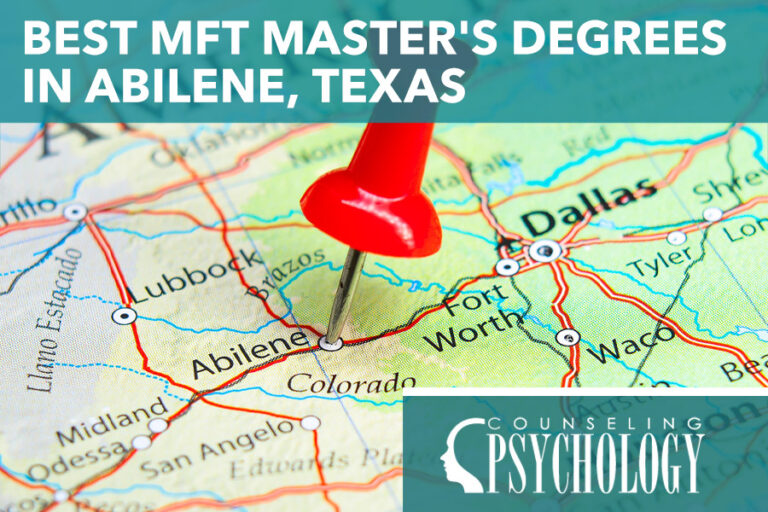Your Complete Guide to the Best MFT Master’s Degrees in Abilene, Texas

Abilene, Texas serves as a vital hub for mental health services throughout West Texas, offering unique opportunities for aspiring Marriage and Family Therapists to receive exceptional training while serving communities with genuine need. As the region’s healthcare and education center, Abilene combines small-town affordability with access to diverse clinical training experiences that prepare graduates for rewarding careers helping families navigate life’s challenges.
The demand for licensed Marriage and Family Therapists continues to grow across Texas, particularly in rural and underserved areas like West Texas where mental health resources remain limited. For prospective students considering an MFT degree, Abilene offers distinct advantages: significantly lower cost of living compared to Dallas, Houston, or Austin; close-knit professional communities that facilitate networking and mentorship; and clinical training opportunities that include military family counseling, faith-based settings, and rural community mental health.
This comprehensive guide explores everything you need to know about pursuing an MFT master’s degree in Abilene, from understanding core curriculum requirements to navigating Texas licensure pathways and building a successful therapy career in West Texas.
Abilene MFT Quick Facts:
- Abilene serves as regional healthcare hub for 22-county area
- Average MFT salary in Texas: $55,000-$75,000 (entry to mid-career)
- Taylor County population: 143,000+ residents
- Major employers: Hendrick Health, Dyess Air Force Base, Betty Hardwick Center
- Abilene cost of living: 18% below national average
- Graduate program completion time: 2-3 years
Find out more about Texas MFT programs.
2026 Best Master's in MFT Programs Near Abilene, TX
Abilene Christian University
Abilene, TX - Private 4-year - acu.edu
Master's - Master of Marriage and Family Therapy
Online Learning - Visit Website
Abilene Christian University's online Master of Marriage and Family Therapy is a COAMFTE-accredited program requiring 60 credit hours over 33 months, with no entrance exam needed. It offers a flexible format at $799 per credit hour and prepares students for national licensure through 100+ internship hours. Concentrations include Child and Adolescent Therapy, Medical Family Therapy, and Trauma Treatment, with a Christ-centered learning environment.
- COAMFTE-accredited online program
- 60 credit hours, 33 months
- $799 per credit hour
- 5 unique concentrations
- Prepares for national licensure
- 100+ internship supervision hours
- Christ-centered learning environment
- Flexible online format
- Multiple start dates annually
Master's - Master of Marriage and Family Therapy (Medical Family Therapy Treatment of Trauma)
Online Learning - Visit Website
Focusing on Medical Family Therapy Treatment of Trauma, this COAMFTE-accredited online MMFT program at Abilene Christian University emphasizes advanced skills for trauma-informed care without an entrance exam. The 60-credit curriculum, completed in 33 months, includes 100+ supervised internship hours and costs $799 per credit hour, preparing graduates for licensure in clinical settings like hospitals.
- COAMFTE-accredited online program
- 60 credit hours, 33 months minimum
- 5 unique concentration tracks
- $799 per credit hour
- 100+ hours supervised internship
- Prepare for national licensure exam
- Christ-centered learning approach
- Flexible online format
- Multiple start dates available
- Practice settings: clinics, hospitals, agencies
Master's - Master of Marriage and Family Therapy (Child and Adolescent Therapy)
Online Learning - Visit Website
Specializing in Child and Adolescent Therapy, Abilene Christian University's online MMFT program is COAMFTE-accredited and requires no entrance exam. It spans 60 credits over 33 months, with tuition at $799 per credit hour, and includes 100+ internship hours. The Christ-centered approach trains therapists to address youth and family dynamics for national licensure.
- COAMFTE-accredited online program
- 60 credit hours, 33 months
- Multiple therapy concentrations
- Cost: $799/credit hour
- 100+ internship supervision hours
- Prepares for national licensing exam
- Christ-centered learning environment
- Flexible online format
- Start dates: March, May 2025
- College of Health/Human Services
Master's - Master of Marriage and Family Therapy (Therapy with Military Families)
Online Learning - Visit Website
Concentrating on Therapy with Military Families, this online MMFT program at Abilene Christian University is COAMFTE-accredited and does not mandate an entrance exam. The 60-credit course takes 33 months, costs $799 per credit hour, and involves 100+ supervised internship hours. It prepares students for licensure with a focus on military family issues in a flexible, Christ-centered format.
- 60-credit COAMFTE-accredited program
- Online flexible learning format
- Five specialized concentrations
- $799 per credit hour
- 33-month minimum completion time
- 100+ hours supervised internship
- Prepares for national licensure exam
- Christ-centered educational approach
- Minimum 3.0 GPA requirement
Hardin-Simmons University
Abilene, TX - Private 4-year - hsutx.edu
Master's - Clinical Counseling & Marriage and Family
Online & Campus Based - Visit Website
Hardin-Simmons University's hybrid Master's in Clinical Counseling & Marriage and Family Therapy integrates faith-based principles with comprehensive clinical training. The CACREP-accredited program requires 60 credits and 700 clinical hours, preparing graduates for LPC and LMFT licensure. Admission includes an interview and recommendation of GRE scores, with a 3.0 GPA prerequisite and 12 psychology prerequisites. Students develop expertise in diverse counseling settings through ethical practice, cultural competence, and advanced research methods, completing the program within seven years.
- CACREP Accredited Program
- 60 Total Credit Hours
- 700 Clinical Experience Hours
- LPC and LMFT Licensure Paths
- 3.0 Undergraduate GPA Required
- Fall/Spring Admission Options
- Interview Required for Admission
- Multiple Mental Health Credentials
- 12 Psychology Prerequisites
- GRE Score Recommendations
Why Pursue MFT in Abilene, Texas?
Abilene’s position as West Texas’s regional center creates exceptional opportunities for MFT students seeking meaningful clinical training and career development. The city hosts major healthcare systems including Hendrick Health, serves as home to Dyess Air Force Base with its military family population, and maintains strong community connections that facilitate professional relationships impossible in larger metropolitan areas.
Key Advantages of Abilene for MFT Education:
- Affordability: Abilene’s cost of living ranks significantly below Texas metros, with median housing costs at $186,000 compared to Austin’s $550,000+, allowing students to focus on education without overwhelming financial stress
- Community Connection: Smaller professional networks mean easier access to clinical supervisors, mentorship relationships, and job opportunities upon graduation
- Diverse Clinical Settings: Training opportunities span military family counseling, rural community mental health, faith-integrated therapy, and traditional clinical settings
- Regional Impact: Graduates directly address West Texas’s mental health shortage, making tangible differences in underserved communities
- Professional Integration: The Marriage and Family Institute serves a dual purpose: to serve the community and to raise up exceptional therapists, creating natural pathways from education to practice
Abilene’s Mental Health Landscape
Major Healthcare Providers:
- Hendrick Health (regional medical center)
- Betty Hardwick Center (behavioral health authority serving 15 counties)
- West Texas Rehabilitation Center
Specialized Settings:
- Dyess Air Force Base family support services
- School-based mental health (Abilene ISD, Wylie ISD)
- Faith-based counseling centers throughout the community
- Private practice groups and individual practices
- Community health organizations
West Texas’s culture emphasizes family values, faith communities, and close interpersonal relationships, creating natural alignment with marriage and family therapy’s systemic approach to healing and growth.
Understanding MFT Degrees: What You’ll Study
Master’s programs in Marriage and Family Therapy provide specialized training in systemic therapeutic approaches that view individuals within their relational contexts. Unlike individual counseling programs, MFT curricula emphasize family systems theory, relational dynamics, and interventions designed to strengthen couple and family functioning.
Core Curriculum Components
| Subject Area | Key Topics | Clinical Application |
| Family Systems Theory | Bowen, structural, strategic approaches | Understanding family patterns and dynamics |
| Couples Therapy | Emotionally-focused therapy, Gottman method | Working with relationship distress |
| Child & Adolescent Development | Attachment, developmental stages | Age-appropriate interventions |
| Multicultural Counseling | Cultural competence, diversity issues | Serving diverse populations |
| Clinical Assessment | DSM-5 diagnosis, treatment planning | Professional evaluation skills |
| Research Methods | Evidence-based practice, outcome studies | Integrating research into practice |
| Ethics & Professional Practice | Legal issues, professional standards | Ethical decision-making |
| Trauma & Crisis Intervention | PTSD, acute stress, crisis response | Addressing traumatic experiences |
| Substance Abuse | Addiction assessment, family recovery | Working with addicted families |
Program Structure:
- Total Credit Hours: 48-60 depending on program and track
- Duration: 2-3 years full-time, 3-4 years part-time
- Clinical Requirements: 500+ hours direct client contact during practicum/internship
- Thesis Options: Some programs offer thesis or non-thesis tracks
Learn about other MFT degrees.
COAMFTE Accreditation Importance
The Commission on Accreditation for Marriage and Family Therapy Education (COAMFTE) serves as the specialized accrediting body for MFT programs. COAMFTE-accredited programs prepare students to sit for the national licensing examination, making accreditation essential for Texas licensure eligibility. Students should verify COAMFTE accreditation status before enrolling in any MFT program to ensure their education meets Texas licensing requirements.
Clinical Training and Practicum Sites in Abilene
Clinical training forms the cornerstone of MFT education, providing hands-on experience working with couples and families under expert supervision. Abilene’s diverse healthcare landscape offers training opportunities across multiple settings, preparing students for varied career paths.
Required Clinical Training Hours:
- Total Supervised Experience: 500-600 hours minimum during graduate program
- Direct Client Contact: Face-to-face therapy sessions with individuals, couples, and families
- Relational Therapy Focus: Minimum percentages working with couples/families (not just individuals)
- Supervision Requirements: Regular meetings with licensed supervisors for case review and skill development
Major Clinical Training Sites in Abilene
Healthcare Settings:
- Hendrick Medical Center: Integrated behavioral health services, medical family therapy
- West Texas Rehabilitation Center: Working with families navigating disabilities and chronic conditions
- Primary care practices: Behavioral health integration models
Community Mental Health:
- Betty Hardwick Center: Comprehensive mental health services for 15-county region, serving diverse populations including underinsured and uninsured clients
- Community counseling agencies: Sliding-scale services for families facing economic challenges
- Crisis intervention services: Acute mental health response and stabilization
Educational Settings:
- Abilene ISD counseling programs: School-based family therapy, working with children and adolescents
- University counseling centers: Serving college student populations and their families
- Head Start programs: Early childhood and family support services
Military and Specialized Settings:
- Dyess Air Force Base family support: Working with military families navigating deployment, relocation, and service-related stress
- Military OneSource programs: Confidential counseling for military-connected families
- Veterans services: Supporting veterans transitioning to civilian life
Private Practice Opportunities:
- Supervision in established group practices
- Solo practitioner mentorship
- Faith-integrated counseling centers
- Specialty practices (trauma, addiction, etc.)
Unique Training Advantages in Abilene:
- Military family counseling expertise (Dyess AFB proximity)
- Rural community mental health experience
- Faith-integrated therapy in Christian counseling settings
- Agricultural family dynamics (ranching/farming communities)
- Cross-cultural work with Hispanic populations
- Small-town practice management skills
These diverse clinical experiences prepare graduates to serve West Texas communities effectively while building versatile skill sets applicable across geographic locations and practice settings.
Texas LMFT Licensing Requirements
To become an LMFT in Texas, you need to complete a master’s or doctoral degree in MFT or a related field, complete 3,000 hours of supervised experience, pass the national MFT examination and Texas jurisprudence exam, following a structured pathway from education through full licensure.
Complete MFT Licensing Pathway
| Step | Requirement | Timeline | Key Details |
| 1. Graduate Education | COAMFTE-accredited master’s degree | 2-3 years | Must include required coursework and clinical hours |
| 2. LMFT-Associate License | Apply upon graduation | Immediately after degree | Allows supervised clinical practice |
| 3. Jurisprudence Exam | Pass Texas law exam | Before associate license | Must be completed no earlier than six months prior to application submission |
| 4. Supervised Clinical Experience | 3,000 hours total supervised practice | 24-48 months | At least 1,500 hours direct client contact |
| 5. Direct Supervision | 200 hours of direct supervision (at least 100 of which must be individual) | Throughout experience period | Regular meetings with approved supervisors |
| 6. National Examination | Pass AMFTRB exam | After supervision completion | 200-question multiple-choice test |
| 7. Full LMFT License | Apply for full licensure | After exam passage | Independent practice authority |
Online MFT Programs
Prospective MFT students can choose between traditional campus-based programs and increasingly available online or hybrid formats, each offering distinct advantages for different learning preferences and life circumstances.
| Aspect | Campus Programs | Online/Hybrid Programs |
| Schedule Flexibility | Fixed class times, in-person attendance | Self-paced coursework, asynchronous learning |
| Clinical Placements | Coordinated by program with established partners | Student arranges locally with program approval |
| Peer Interaction | Regular in-person relationships, study groups | Virtual communities, video conferences |
| Faculty Access | Office hours, informal interactions | Email, scheduled virtual meetings |
| Program Cost | Higher (on-campus fees, housing) | Lower overhead, reduced travel |
| Hands-on Training | Immediate lab access, role-play practice | Intensive weekend sessions, local arrangements |
| Technology Requirements | Campus resources available | High-speed internet, personal equipment |
| Commuting | Required for all classes and activities | Minimal for intensive sessions only |
Benefits for Abilene-Based Students:
Campus programs provide structured learning environments with immediate peer support and faculty accessibility. For Abilene residents, attending local programs eliminates relocation costs while maintaining community and employment connections.
Online programs provide convenience and flexibility while remaining COAMFTE-accredited, making them viable alternatives for students balancing work, family, or other commitments. Students in online programs complete clinical training at approved sites near their homes, often in Abilene-area agencies and practices.
Both formats prepare students for successful careers when programs maintain COAMFTE accreditation and provide adequate clinical training and supervision.
Abilene MFT Degree Financial Considerations and ROI
MFT education represents a significant investment requiring careful financial planning. Abilene’s affordability compared to major Texas cities provides distinct economic advantages that reduce total educational costs and debt burden.
MFT Master’s Cost Breakdown in Abilene
| Expense Category | Estimated Range | Abilene Advantage |
| Tuition & Fees | $30,000-$60,000 total | Competitive with Texas programs |
| Housing (2-3 years) | $18,000-$36,000 | Median rent $950/month vs $1,800+ in Austin |
| Living Expenses | $20,000-$35,000 | 18% below national average |
| Clinical Training Costs | $2,000-$5,000 | Background checks, malpractice insurance |
| Licensure Fees | $500-$1,000 | Application, exams, initial license |
| Books & Materials | $2,000-$4,000 | Textbooks, assessment tools |
Abilene Cost of Living Advantage:
Abilene’s affordability significantly reduces total educational investment compared to studying in major metros:
- Median home price: $186,000 (vs $550,000+ in Austin, $380,000+ in Dallas)
- Average apartment rent: $950/month (vs $1,800+ in major cities)
- Overall expenses: 18% below national average
- Lower transportation costs with minimal traffic
- Reduced entertainment and dining expenses
This affordability enables students to minimize student loans, work part-time without overwhelming stress, and graduate with manageable debt levels.
Texas MFT Funding Resources:
- Texas Association for Marriage and Family Therapy scholarships
- American Association for Marriage and Family Therapy Foundation awards
- Local mental health authority scholarships
- Church and faith-based educational grants
- Employer tuition reimbursement programs
Return on Investment Analysis
| Career Stage | Annual Salary Range | Years Post-Graduation |
| LMFT-Associate | $40,000-$50,000 | 0-2 years |
| Newly Licensed LMFT | $50,000-$65,000 | 2-5 years |
| Experienced LMFT | $65,000-$85,000 | 5-10 years |
| Private Practice Owner | $75,000-$100,000+ | Varies |
Break-Even Timeline: Most graduates recover educational investments within 5-8 years, sooner for those establishing successful private practices or advancing to clinical leadership positions.
Lifetime Earnings Increase: MFT professionals typically earn $500,000-$800,000 more over their careers compared to bachelor’s-level human services positions, while enjoying greater professional autonomy and career satisfaction.
Career Opportunities for MFTs in Abilene
West Texas faces significant mental health workforce shortages, creating strong demand for licensed Marriage and Family Therapists across multiple practice settings. Abilene’s position as regional hub means MFTs serve not only Taylor County but surrounding communities throughout the Big Country region.
Employment Settings in Abilene
Community Mental Health:
- Betty Hardwick Center (15-county service area)
- Community counseling agencies
- Crisis intervention services
- Substance abuse treatment facilities
Healthcare Systems:
- Hendrick Health behavioral health services
- Primary care integrated behavioral health
- Specialty medical practices (pain management, oncology, etc.)
- Home health and hospice services
Military and Veterans Services:
- Dyess Air Force Base family support programs
- Military OneSource contracted providers
- Veterans Administration services
- Military family life counselor positions
Educational Settings:
- School-based mental health services (Abilene ISD, Wylie ISD)
- University counseling centers (ACU, McMurry, Hardin-Simmons)
- College student support services
- Educational consulting
Faith-Based Organizations:
- Church counseling ministries
- Christian counseling centers
- Pastoral counseling positions
- Faith-integrated therapy practices
Private Practice:
- Solo private practice
- Group practice arrangements
- Specialty practices (trauma, addiction, marriage enrichment)
- Telehealth therapy services
Abilene Area MFT Salary Expectations:
| Experience Level | Salary Range | Work Setting | Benefits |
| Entry-Level LMFT-Associate | $40,000-$50,000 | Agency/community mental health | Health insurance, retirement, supervision |
| Licensed LMFT (0-3 years) | $50,000-$65,000 | Various settings | Full benefits packages |
| Experienced LMFT (5+ years) | $65,000-$85,000 | Leadership/specialized | Enhanced benefits, autonomy |
| Private Practice Owner | $75,000-$100,000+ | Self-employed | Variable, full control |
Salaries in Abilene typically run 10-20% below major metro areas but offer substantially better purchasing power given the region’s lower cost of living. A $60,000 salary in Abilene provides comparable or superior quality of life to $75,000-80,000 in Austin or Dallas.
Job Market Outlook:
- West Texas mental health workforce shortage creates consistent demand
- Rural health initiatives increase funding for community mental health
- Military family counseling needs remain strong with Dyess AFB presence
- Growing mental health awareness in faith communities expands opportunities
- Telehealth expansion allows Abilene-based therapists to serve broader geographic areas
- Limited competition compared to saturated urban markets
Frequently Asked Questions
Q: Do I need to live in Abilene to attend an MFT program there?
A: It depends on the program format you choose. Traditional campus-based programs typically require in-person attendance for classes, though some students commute from nearby communities. Online MFT programs offer convenience and flexibility. If you’re considering an online program based in Abilene, you can complete your degree while living elsewhere in Texas or beyond, though you’ll need to coordinate local clinical placements that meet program requirements.
Q: What’s the job market like for MFTs in Abilene and West Texas?
A: The job market for Licensed Marriage and Family Therapists in West Texas remains strong due to ongoing mental health workforce shortages in rural areas. Betty Hardwick Center, the region’s mental health authority serving 15 counties, consistently seeks qualified therapists, while healthcare systems like Hendrick Health expand integrated behavioral health services. Dyess Air Force Base creates ongoing demand for therapists experienced with military families, and faith-based counseling centers throughout the region actively recruit LMFTs who can integrate spiritual dimensions into clinical work. Unlike saturated markets in Austin or Dallas where new graduates compete intensely for positions, Abilene-area therapists often receive multiple job offers and can be selective about practice settings.
Q: Are online MFT degrees respected by Texas licensing boards and employers?
A: COAMFTE-accredited online programs prepare students to sit for licensing examinations and meet all Texas licensing requirements, making them fully equivalent to campus-based degrees in the eyes of the Texas Behavioral Health Executive Council. What matters for licensure is COAMFTE accreditation status, not delivery format. In Abilene’s market, practical clinical skills, supervision quality, and personal fit with organizational culture matter more than whether your degree was earned online or on-campus. Focus on choosing COAMFTE-accredited programs with strong clinical training components and reputable institutions rather than worrying excessively about online versus campus format.
Q: What makes Abilene different from studying MFT in Dallas or Houston?
A: Abilene offers distinct advantages for students seeking affordable education, close-knit professional community, and training addressing rural mental health needs. The cost difference is substantial; Abilene’s living expenses run 18% below national average with median housing at $186,000 versus $550,000+ in Austin and $380,000+ in Dallas. Professionally, Abilene’s smaller community creates easier access to clinical supervisors, mentorship relationships, and job opportunities that would require extensive networking in competitive urban markets.



